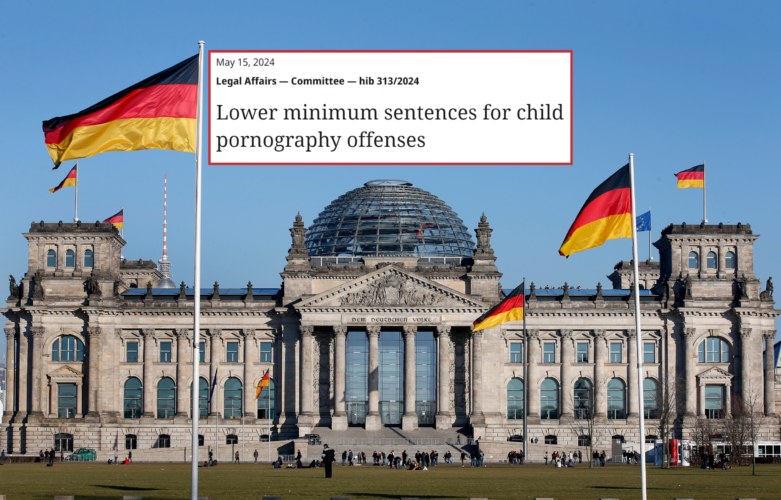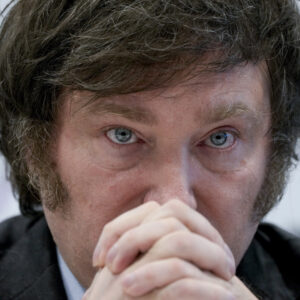The Parliament of Germany voted on Thursday to lower the criminal penalties for possession of child pornography, downgrading the offense from a felony to a misdemeanor. The decision by the governing body, known as the Bundestag, is being celebrated by “pedosexual” activist groups—many of which are now seizing on the momentum to lobby for reducing Germany’s age of consent to just 12 years old.
First reported by Reduxx, the bill approved by a committee of the Bundestag last week will amend a section of the German Criminal Code to significantly shorten prison sentences for “dissemination, acquisition, and possession of child pornographic content.” According to the current draft of the bill:
Possession and acquisition should in [the] future be punishable with a minimum penalty of three months’ imprisonment, and distribution with a minimum penalty of six months’ imprisonment. The offenses regulated in Section 184b of the Criminal Code are therefore classified as misdemeanors and not as crimes.
🚨Germany's Parliament has officially voted to decriminalize the possession of child pornography.
The move is being celebrated by a "pedophile rights" activist group which has also called for the age of consent to be dropped to 12.https://t.co/JtUNA4wgZg
— REDUXX (@ReduxxMag) May 21, 2024
Possession of child sex abuse material was first made a felony in Germany in 2021 when Federal Justice Minister Christine Lambrecht of the Social Democratic Party implemented a mandatory one-year minimum sentence for the offense.
Learn the benefits of becoming a Valuetainment Member and subscribe today!
Critics of the bill included members of Germany’s Christian Democratic Union (CDU) and Christian Social Union of Bavaria (CSU) parties, with the Alternative für Deutschland (AFD) party abstaining. A statement of opposition from the CDU and CSU declared that “the distribution, possession and acquisition of child pornography must, in principle, remain classified as crimes,” and that the passage of the bill sends “the wrong signals.”
According to Reduxx, the purpose of the bill is to provide considerations for parents and teachers who download child pornography for the purposes of alerting police. These same considerations also extend to juvenile offenders who “do not act in order to be sexually aroused by the child pornography content, but rather out of a drive typical of the adolescent stage of development, such as naivety, curiosity, thirst for adventure or the desire to impress.” Other carveouts exist for adolescents who make or distribute pornographic images/videos of themselves, often under coercion from online predators.
Related: Meta Platforms Sued for Enabling Child Pornography, Human Trafficking
However, the bill does not create special exemptions for these circumstances, but rather reduces penalties for all child pornography charges—a fact that, as the outlet notes, “has not gone unnoticed by pro-pedophile campaigners.”
Notorious pro-pedophile activist group Krumme-13, or K13, a “self-help” organization for “pedosexuals,” is celebrating the reversal of the 2021 law as a step forward for their sexual minority group. K13, which was founded by repeat child pornographer Dieter Gieseking, actively lobbies to decriminalize sexual relationships between adults and children, and is currently pushing to have Germany’s age of consent dropped to 12 years old.
“The taboo of pedophilia must finally be broken at all levels of society. If a pedophile can come out without fear of exclusion or even demonization, then this is the best prevention against child abuse,” Gieseking told a German news outlet in 2014.
“For babies and toddlers and elementary school students, the sexual component in such a ‘relationship’ is problematic. This would have to be discussed separately,” he continued. “From a sexual policy perspective, an age of consent of 12 is appropriate and long overdue in today’s enlightened society. There are boys and girls who take the initiative in a friendly and sexual relationship with a pedosexual. Therefore, there is a need for sexual criminal law reform that does justice to everyone involved.”
The bill, which will likely take effect in the coming months, is the latest in a series of lenient legal decisions regarding sexual degeneracy and child abuse. Earlier this year, for example, a 52-year-old male identifying as transgender was given a light sentence for possession of child pornography after arguing that he only retained the materials to help him develop his “gender identity.”
Connor Walcott is a staff writer for Valuetainment.com. Follow Connor on X and look for him on VT’s “The Unusual Suspects.”



















Add comment